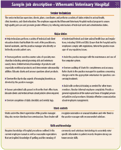Move your job in the right direction
Frustrated with your work? Use this advice to choose the right path and take control of your career.
Same crap, different day," is Sarah's usual reply when Ashley asks how she's doing. As she catches up on the surgery logs at the Whereami Veterinary Hospital, Sarah's mind wanders. What happened to those days when everything was new and exciting and she just couldn't wait to get to work?
As she starts her car that evening, Sarah thinks, "I am so out of here." All the way home she builds her list of frustrations: "No training, no way to get a raise, nobody listens to anything I have to say, no one tells me what's going on, I never learn anything new, and it'd be nice to go a week without a new employee going to lunch and never coming back. It's time to move on."

Sheila Grosdidier
Sound familiar? The 2005 Advanstar Veterinary Healthcare Communications (AVHC) Veterinary Team Study shows that many of you list lack of empowerment as one of your top frustrations in practice. And for years, team members have urged practice owners and managers to give them more control. But you don't have to wait for change—unless you've decided to accept feeling disappointed, frustrated, and under-compensated as part of the job description. You have more power than you realize.
Set your course
Arguably, the most damaging assumption you can make about your career is that you work for someone else. OK, you do receive a paycheck, and you report to a boss. But ultimately you make the decisions that put you on the path toward—or away from—success. You're essentially self-employed, and you offer your services and skills to your client, the practice. Embracing this idea takes you from just having a job to having a career. (See "Are You Self-Employed?" below.)
This shift from being just an employee to being a skillful, self-employed entrepreneur is the first step to building a fulfilling career. Successful self-employed people know that to increase their value, they must help grow the business and be true partners in the practice.
What do you do that influences the practice's success? If you're not sure, start keeping a monthly list that highlights the things you've done to help build the practice. See "Create a Success Journal" on for inspiration. Once you've finished, take a moment to read your list and feel pride in all that you do.

Sample job description-Whereami Veterinary Hospital
Ask for directions
The 2005 AVHC Veterinary Team Study also shows that you want feedback about your performance. And that's not unique to veterinary practice. Almost everyone wants more feedback. And you're not alone if you've found that waiting for others to offer input hasn't worked well so far.
So take charge. Solicit the feedback you need to grow and enjoy your position. Start by asking your manager what he or she sees as your strengths. Then ask, "What are three things that I could do to enhance the practice?"
Of course, you need the right tools—for example, job descriptions, performance reviews, and compensation statements—as a foundation. (Visit firstlinemag.com to download sample copies of these forms, and see the sample job description on.) You need these tools so you know what's expected of you and to find out regularly what you're doing well and where you could improve. Use these steps to encourage your supervisor to implement these tools in your practice:
- Ask team members what they think about job descriptions and evaluations so you can share their feedback with your supervisor.
- Identify the benefits for the practice when you use these documents. For example, employees understand what's expected of them and are more efficient.
- Explain how these tools will help you work more effectively in your position.
Imagine you're playing a baseball game, but you won't know the score until the end of the game. How do you know how well you're doing? Don't wait for the game to be over before asking for feedback on your performance. All too often team members learn just how valuable they are after they've decided to quit the team. These tools help you gauge your performance.

Are you self-employed?
Drive income
Many practice management experts agree that team members' wages should account for between 16 percent and 20 percent of the practice's gross revenue. Of course, you help determine the practice's gross revenue, so what you earn could be more in your hands than you think.

Additional reading
When you generate more revenue, the practice can pay you more. And you may be able to capture 20 percent or more in lost charges with a few simple changes. Try these tips to maximize your practice's revenue:
- Charge for everything you do. The average clinic gives away $10,000 a year in nail trims and fecal exams alone.
- Add service codes to your charge sheet for the services you recommend, such as dental prophies and senior wellness screenings so it's easier to follow up with clients. Some clients need time to consider a recommendation. So wait a few days and then send a follow-up letter to remind clients to schedule appointments.
- Educate clients about the services you offer. For example, do you offer pain-management protocols or presurgical testing? You can take clients on a hospital tour or create a bulletin board with pictures to highlight your services. (For more, see "Don't Let Charges Escape (And Why You Should Care),".)
Pause for rest stops
Burnout drains your ability to enjoy your job. It's a filter that distorts everything you see. Over time, your frustration, stress, and lack of direction can lead to imbalance between your personal and professional life. Fortunately, the first step to recovery is to admit that you have a problem.
Consider these warning signs of burnout:
- You're easy to anger.
- You've lost your sense of accomplishment.
- You feel physically or emotionally exhausted.
- You experience generalized sadness.
- You experience difficulty sleeping or feel the desire to sleep excessively.
- You feel nervous all the time.
If this list looks all too familiar, you need to address this problem before you do anything else to help manage your career. One resource: Helpguide.org recommends steps that help you address your physical, mental, and social needs to prevent or reduce burnout.
For example, physically, you may need to see a doctor, catch more shut-eye, eat right, and exercise. Mentally, it helps to learn to more effectively manage your time, set realistic goals, and put yourself first. And socially, you should work on addressing your dissatisfaction at work, practicing healthy communication, and nurturing your closest relationships with friends and family.
You choose your path
On the road to success it helps to have managers who see your potential. But change and growth truly start with you. Each day you make a decision to be an entrepreneur or to be a victim who believes other people control your life. Take the first step in fulfilling your potential today. Think about all the reasons you chose this profession—and fall in love with your job again.
Create a success journal
Once a month, take some time to think about what you accomplished. Then, share your journal with your supervisor during your performance review. Your journal may explore:
- What you did this month above and beyond your job description
- How you helped other team members
- What you did to make clients feel special.
Sheila Grosdidier, RVT, is a Firstline Editorial Advisory Board member and a consultant with VMC Inc. in Evergreen, Colo. Please send questions or comments to firstline@advanstar.com.